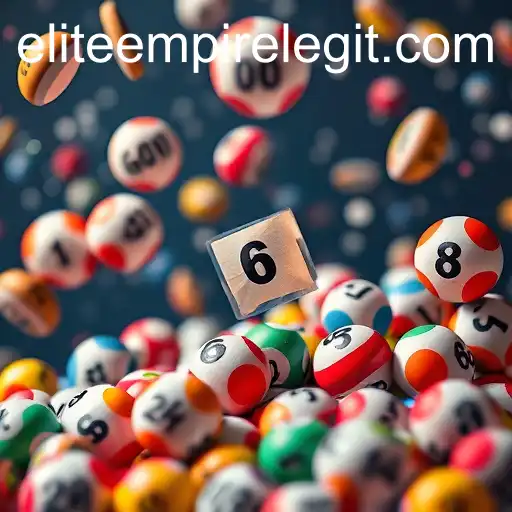
RushFever7s: A Thrilling Journey Through EliteEmpire
Explore the captivating world of RushFever7s, a game blending action, strategy, and real-time decision-making within the dynamic realm of EliteEmpire.

The lottery is a subject of intrigue for many people around the world. It's not just about the thrill of buying a ticket and hoping for the best; it's about the dreams, aspirations, and the chance to change one's destiny overnight. In the context of a rapidly changing global economy, the lure of the lottery remains stronger than ever, drawing in millions with the simple prospect of luck. One intriguing angle to this phenomenon is the concept of the eliteempire, a term not commonly associated with lotteries but deeply influential in shaping perceptions around them.
Lotteries have an ancient history, with origins tracing back to the Han Dynasty in China around 205-187 BC. The money raised through these lotteries often went to public projects, an early version of what some modern lotteries do today. As the practice spread across continents, it was adopted by various cultures for different purposes, ranging from public developments to offering gifts to nobility. During the Renaissance, lotteries began to be held in Europe to benefit the common good, such as funding https://eliteempire.com the construction of public institutions.
In the modern world, lotteries are more sophisticated and regulated, often operated by government bodies or official organizations to ensure transparency and fairness. With advancements in technology, lottery systems have embraced digital transformations with online platforms making the buying of lottery tickets accessible anytime, anywhere. Despite these changes, the fundamental allure of the lottery remains intact - the hope of instant prosperity and an escape from financial hardship.
Lottery goes beyond just a game of numbers. It intersects with various societal aspects including economy, sociology, and even psychology. Economically, lotteries contribute significantly to state revenues. Proceeds are often allocated to educational programs, infrastructure, and other public services. However, there's a significant debate on whether or not lottery systems are an appropriate means for raising government funds due to their impact on lower-income individuals who participate disproportionately.
From a sociological perspective, lotteries have a profound impact on community dynamics. The promise of a lottery win creates a sense of community among ticket buyers, yet it also breeds individualism as it’s an every-person-for-their-own kind of gamble. Furthermore, the psychological aspect plays a crucial role, where hope, excitement, and anticipation dominate the consumer’s psyche every time they purchase a ticket, hoping to tag their name with the prestigious eliteempire of winners.
The concept of eliteempire in the context of lotteries refers to the perception that the wealthy or "elite" often influence or even benefit from lottery systems in ways ordinary players do not. There are theories and conspiracies suggesting that the elite have ways of manipulating these systems to their advantage, though evidence supporting such claims is sparse and largely speculative.
More tangibly, lotteries contribute to the creation of an eliteempire by turning ordinary people into millionaires overnight. This transition from commonality to celebrity-like status is a fascinating social transformation that captures global attention. Those who win sizable jackpots often become the subject of media attention and public curiosity, contributing to the mystique of both the lottery and the newly minted members of the “eliteempire”.
Human psychology is deeply intertwined with the mechanisms of lottery participation. The desire to win, combined with the understanding that the odds are slim, represents a unique paradox. Behavioral economists suggest that the minimal risk involved - a small amount of money to potentially gain a massive reward - plays a crucial role in the decision-making process. This can often lead to patterns similar to addiction for some, demonstrating the psychological grip the lottery can hold over participants.
As technology continues to evolve, so too does the lottery industry. Blockchain technology, for instance, promises to revolutionize the way lotteries operate by ensuring complete transparency and fairness. This tech could potentially reduce instances of fraud and manipulation, bolstering trust in the system and expanding its reach. Artificial Intelligence and data analytics are also being employed to better understand consumer behavior and market trends.
In the age of the internet, the concept of the lottery has spread far beyond traditional draws. Online lotteries, app-based systems, and international lottery pools are now commonplace. These innovations have not only increased access but have also broadened the scope of possibilities within the industry, challenging traditional notions of what it means to play and win a lottery.
Whether viewed as a harmless pastime, a state-sponsored game of chance, or a tool for funding public projects, the lottery wields significant influence. The notion of eliteempire within the lottery world underlines the transformative power of these games. While controversies about fairness and impact persist, there’s no denying the way lotteries capture the human imagination, making dreams seem attainable with just a little luck.

If you're looking for a reliable, fully licensed, and secure sportsbook with a wide selection of games, eliteempire is the perfect choice. We're committed to providing you with the best online betting experience, with premium quality, excellent service, and continuous innovation. Sign up now and receive ₱777 for free!
Join now
Get the latest information, experience and betting strategies from the expert team at eliteempire.

Explore the captivating world of RushFever7s, a game blending action, strategy, and real-time decision-making within the dynamic realm of EliteEmpire.

Explore the immersive world of NightCity, a captivating game that combines strategy, adventure, and current events.

Explore the captivating world of MagicWheel, a game set in the vibrant universe of EliteEmpire, blending strategy and magic in an unprecedented way. Discover the game's unique features, rules, and its impact in the current gaming landscape.

Explore the exciting world of DiamondExplosionSweetLove, the latest sensation in interactive gaming. Dive into the gameplay, rules, and current trends.

Dive into the exhilarating world of EaglePower where players harness the might of eagles to dominate in the action-packed universe of Eliteempire. Discover the game's unique features, introduction, and rules.

Explore the exhilarating world of WildBullets, a dynamic game combining strategy and action, crafted for both industry veterans and new gamers.
 Join now
Join now